|
(17 March 2011, Chatham House)
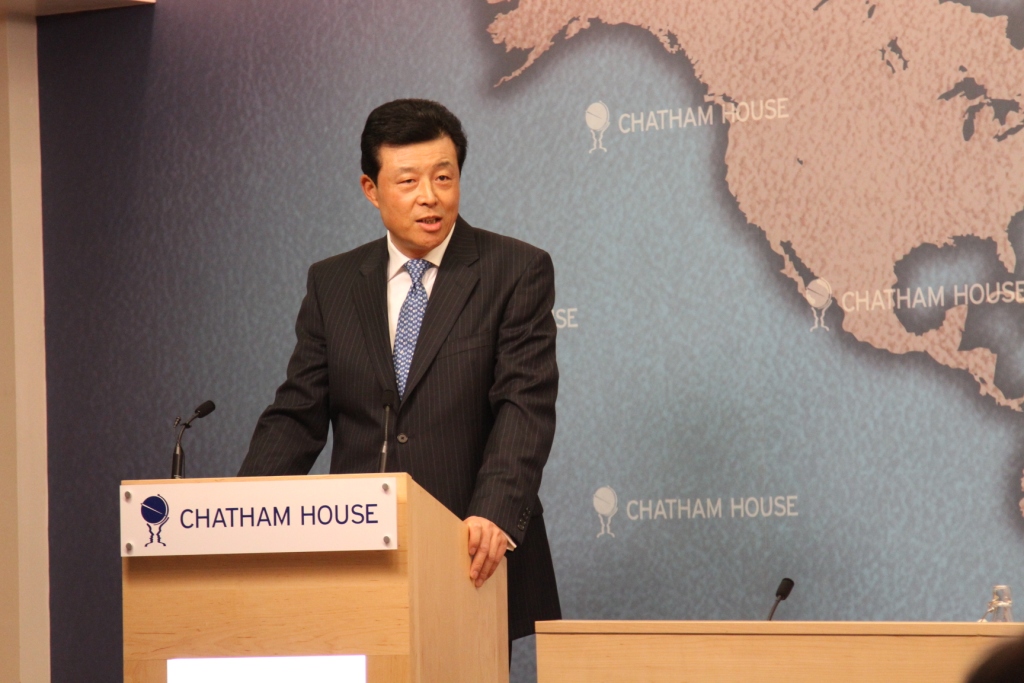
Dr Robin Niblett,
Ladies and gentlemen,
It is my great honour to address Chatham House, an institute with a world reputation and a long history. I first heard about Chatham House more than 20 years ago when I was working in the United States. "Chatham House rule" was often applied in the academic events I attended. Thanks to Dr Niblett and his colleagues, I have learned much more about Chatham House and its proud tradition of independent thinking and profound scholarship since I came to the UK.
My topic today is China's future development. To understand the thinking and the direction of China's development for the next 5 years, we need to take a closer look at the 12th Five Year Plan that was adopted at the recent annual parliamentary session in China.
As far as I can see, the 12th Five-Year Plan boils down into two key terms – "scientific development" and "peaceful development".
Some people in the West may be curious about the term 'scientific development'. I think it can be explained in four words: "balanced, inclusive, comprehensive and green development".
"Balanced" means China must upgrade its growth model and economic structure. Being the second largest economy, China may lead the world in growth rate and economic size, yet its low-cost industrialisation model is exhausting its potential. So China must go beyond size and speed to achieve strength and quality. This is why the economy is set to grow by 7% annually in the next 5 years, which is a marked slowdown from the double digit growth over the past 3 decades. This slower quantitative growth will make more room for higher qualitative growth and create conditions for 4 major transitions:
-
a move from reliance on investment and export to balanced growth driven by consumption, investment and export;
-
a shift from low labour cost to home-grown innovation;
-
a change from traditional industries to emerging strategic industries and modern services;
-
and an evolution from energy and resources consuming development to low-carbon and green growth.
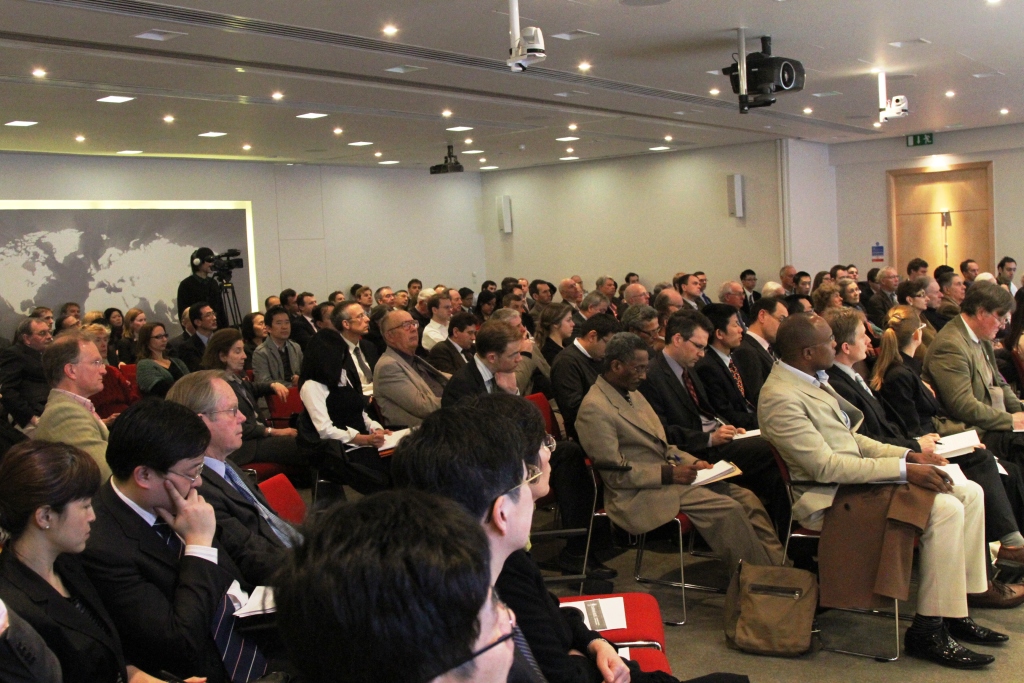
By "inclusive", we mean we want to deliver a happier and more dignified life for every Chinese and make sure that we all share in the benefits of our development. The ratio of earnings to GDP in China remains low, and the Gini Coefficient is high. The quality of public services is far from matching the pace of economic growth. To overcome the "middle income trap", the 12th Five-Year Plan rightly gives priority to strengthening social programmes and improving people's living standards. To this end, we need to put more money in people's pockets and raise the ratio of income to GDP by 10 percent over the next 3 to 5 years, and provide better public services. The government must listen to the people, understand their hopes and worries and tries its best to help them. Major steps will be taken in the next 5 years to strengthen the social safety net for farmers, urban workers and residents, and put in place a mechanism that ensures the minimum living allowance. In this way, we will make steady progress towards providing all our citizens with a good education, a decent income, quality health care, an old age pension and suitable housing.
By "comprehensive", we want to ensure progress on every front, be it economic or social, political or cultural. The 12th Five Year Plan calls for bolder steps in reform and innovation across all of these areas. This will help to improve coordination and decision-making, break institutional barriers to productivity and promote social justice. Some people in the West believe that China only focuses on economic growth and ignores social progress, and that it only carries out economic reform, not political reform. This is a misunderstanding. Over the past 30 years, political reform has come with economic changes every step of the way. We have seen the growing role of the National People's Congress and multi-party political consultation under the leadership of the Communist Party. Democratic decision making and the legal system have been strengthened, with the millennium-old pattern of "rule by man" giving way to the rule of law. Democracy within the party is also developing rapidly. Life-long tenures of leadership position were abolished many years ago and competitive promotion with public consultation is becoming the norm. Direct election at village level was expanded and multi-candidate elections for offices at both central and local levels have been expanded. The 12th Five-Year Plan reaffirms that China will move ahead with political reform, and improve socialist democracy and the rule of law. We will increase government accountability, subject officials to scrutiny by the general public and build a government of the people, by the people and for the people. The people's participation in state as well as economic and cultural affairs is also being encouraged and protected. We will stay committed to the rule of law. China's political reform has never stopped and will not stop in the future.

By "green", we are stressing the need to reduce environmental costs of development. The 12th Five-Year Plan calls for building a resource-efficient and environment-friendly society, that is to say, we need to better protect the environment and address the issues around climate change. This has resulted in specific targets, which include:
-
Raising the share of non fossil fuels in primary energy consumption to 11.4%;
-
Reducing energy and carbon dioxide intensities by 16% and 17% respectively;
-
Cutting the discharge of main pollutants by 8-10%;
-
Increasing forest stock by 600 million cubic metres and forest coverage to 21%.
I often remind business leaders in this country who are interested in doing business in China that in the past, foreign-invested projects were evaluated on the basis of their economic returns. Now it is environmental impact, as China no longer welcomes polluting, energy-and-resources-consuming businesses. Instead it encourages foreign investors to channel their capital into high-end manufacturing, high-tech industries, modern services, new energy and environment-friendly projects.
The 12th Five-Year Plan also sends another message – peaceful development. China remains committed to an independent and peaceful foreign policy. It believes in win-win opening-up and hopes to work with countries to build a harmonious world of lasting peace and common prosperity.
To understand China's peaceful development, we need to be aware of 3 key points:
First, peaceful development is a natural extension of our scientific development. We live in a globalised world and in an era of increasing independence among countries. China's future has never been so closely linked to that of the rest of the world. China's scientific development calls for international cooperation and a peaceful environment. China has worked hard to deepen its friendship and cooperation with its neighbours, with developed countries and other developing countries. China will, through its scientific and peaceful development, contribute ever more to peace and development of the region and the world.
Second, China's peaceful development is open, cooperative and win-win to others.
China's development is an open development, as development behind a closed door has long been a thing of the past. China needs to open up and the world needs an open China. This is recognised in the 12th Five-Year Plan, as it emphasizes the need to open more industries up to the world and to be an active player in global economic governance and regional cooperation.
China's development is a cooperative development. Being a member of the international community, China understands too well that interests of all countries can be best served when countries stand together through thick and thin and when they share both interests and burdens. China advocates amity not animosity; cooperation not confrontation; mutual trust not suspicion; and treating each other as equals not imposing on others.
China's development is a win-win development, as it encourages a synergy between its own interests and the interests of others, and seeks mutual development. It will never follow a beggar-thy-neighbour approach. It understands that China can develop and enjoy security and prosperity only when other countries enjoy the same.
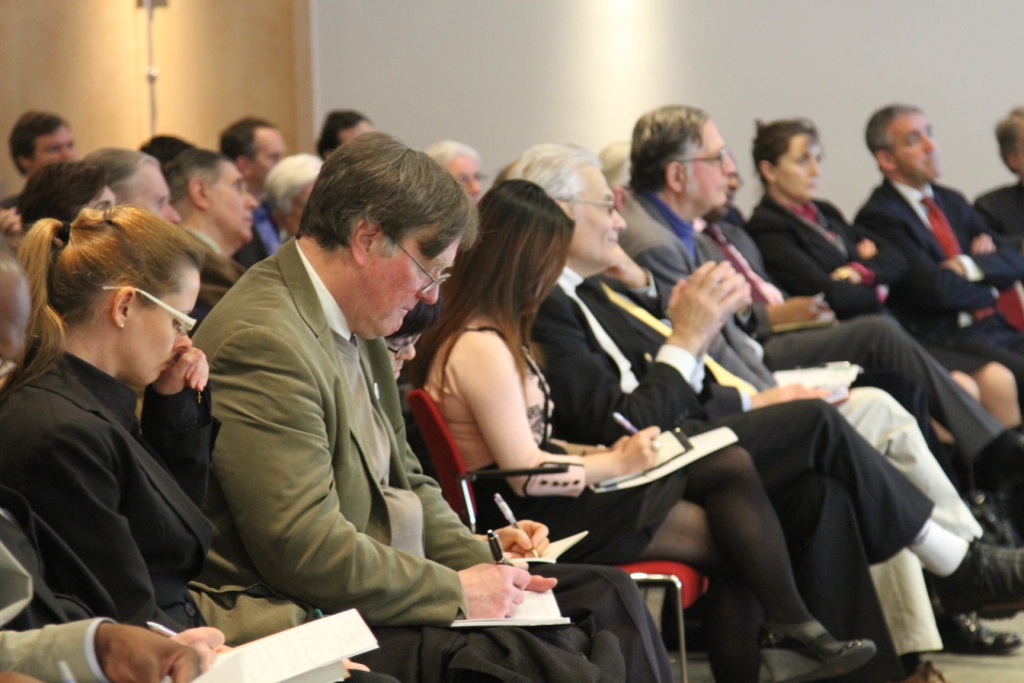
Third, China's peaceful development is a blessing and opportunity to the world. The more developed China becomes, the greater its contribution to the world will be.
China's development is an important part of human progress. Since reform and opening-up more than 30 years ago, 300 million people have been lifted out of poverty. China has managed to feed one fifth of the world's population with only 7% of the world's arable land. It is now the second largest economy, and enjoys political and social stability. A recent Reuters/Ipsos poll showed that 78% of the Chinese people surveyed are confident about their future. With one fifth of the world's population enjoying a peaceful and prosperous life, China has made a big contribution to world peace and prosperity.
China's peaceful development is an engine and opportunity for world economic growth. As the world's largest exporter and manufacturer, China produces affordable and quality goods to the benefit of consumers across the world. At the same time, China is the world's No.2 importer, having imported nearly 1.4 trillion US dollars worth of goods last year, an increase of 38.7%. These imports have boosted economic growth in its trade partners. Last year EU's export to China increased by 31.9%, and the figure for the UK was as high as 42%. As China continues to stimulate demand and consumption at home, it is well on the way to becoming the world's largest consumer market.
China has attracted over 700 billion US dollars of foreign investment over the past decade. This has enabled foreign businesses to be an important part of China's development and to share in the growing boom of the Chinese market. Last year, China invested nearly 60 billion US dollars overseas, ranking it first amongst developing countries. China's economic growth has encouraged Chinese businesses to "go-global" and contributed to economic and social progress and job creation across the world. In 2009, overseas branches and subsidiaries of Chinese companies paid a total of 10.9 billion US dollars in local taxes and hired a local work force of 438 thousand people. Over the past decade, Chinese businesses have helped to build 60 thousand kilometres of road and 70 million square metres of housing across Africa. Research by the Financial Times shows that in the past two years, China has given record loans of 110 billion US dollars to other developing countries, higher than the World Bank.
China played a pivotal role during the Asian financial crisis in 1997. As the financial crisis of 2008 hit developed countries, China provided a strong boost to the global economy by adopting a huge economic stimulus package and maintaining rapid growth. It contributed 50% to global growth in 2009 and 20% in 2010. It stood firmly by Europe during the European debt crisis last year. Instead of selling euro assets, it offered a helping hand to its European partners and supported their efforts to recover from the crisis.
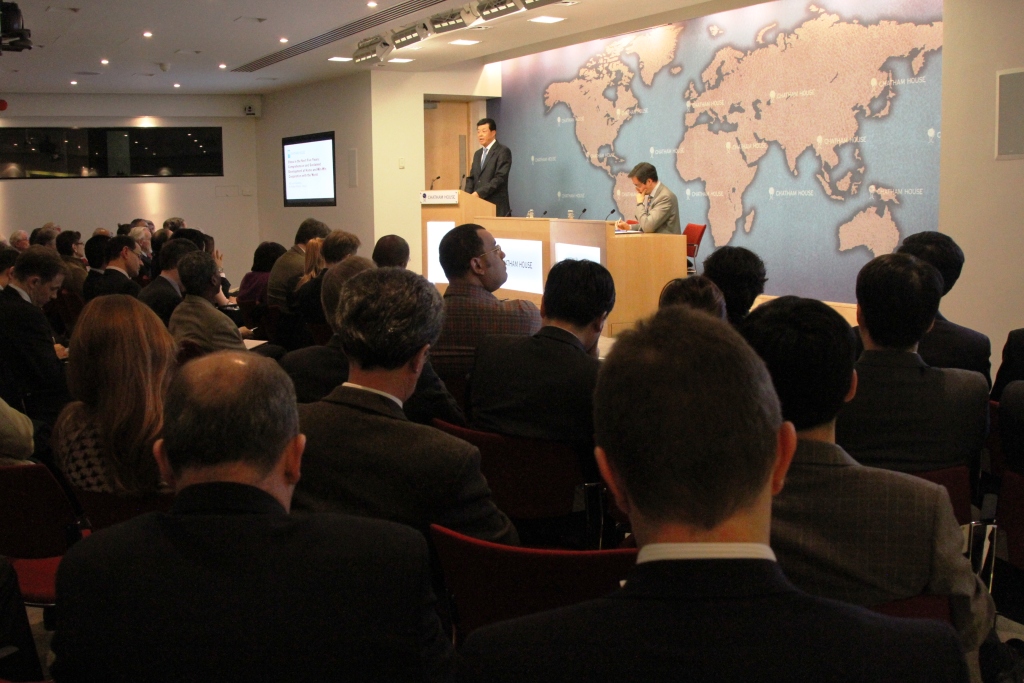
China's peaceful development has proved to be a strong force for world peace and stability. China has solemnly pledged to the world that hegemony or expansion is not an option for China; China stands for non-interference in others' internal affairs and negotiated solutions to international disputes. China believes that security should be based on mutual trust, mutual benefit, equality and co-ordination. China is the largest contributor of peacekeepers among the five permanent members of the UN Security Council. We have lent 10,000 peacekeepers to 24 UN missions. It has sent escort ships to the waters off the Somali coast and worked with the navies of other countries to combat piracy and improve safety in international waters. It has actively worked to facilitate the Six-Party Talks and negotiations over the Iranian nuclear issue to uphold peace and stability in the region. China has played an active part in the G20 summits and other multilateral institutions, and helped strengthen the reform of global economic governance. It is working with the international community to find a more effective way to meet global challenges such as climate change, energy, resources and food security and terrorism. Recently, despite its own losses and sufferings in earthquakes, China has sent rescue teams to New Zealand and Japan, as well as offering them assistance in cash and in kind. China is in every way an upholder of peace and a facilitator of stability.
Looking into the future, China's task in the next 5 years is to ensure that scientific and peaceful development is both achievable and mutually reinforcing. There is every reason to be confident that China's road ahead will be broader and even more promising.
Ladies and gentlemen,
China's development and rejuvenation has been new to the world, and there has been no historical parallel to the road China has travelled. So, how should people see China's development? Let me quote an ancient Chinese saying, "To hear about something is better than not hear about it; To see it is better than hear about it, to know it still better than see it, yet to fulfil it through action is the ultimate form of knowledge". Interestingly this saying happens to have a very close English equivalent, "I hear and I forget; I see and I remember; I do and I understand." I do hope that people will reject stereotyped thinking, try to hear, to see and to understand China with an open mind, and seize opportunities presented by China's development. I am confident that by sharing opportunities and working together, we will make our world a better place of peace, prosperity and harmony.
Thank you. Now I would like to take your questions.
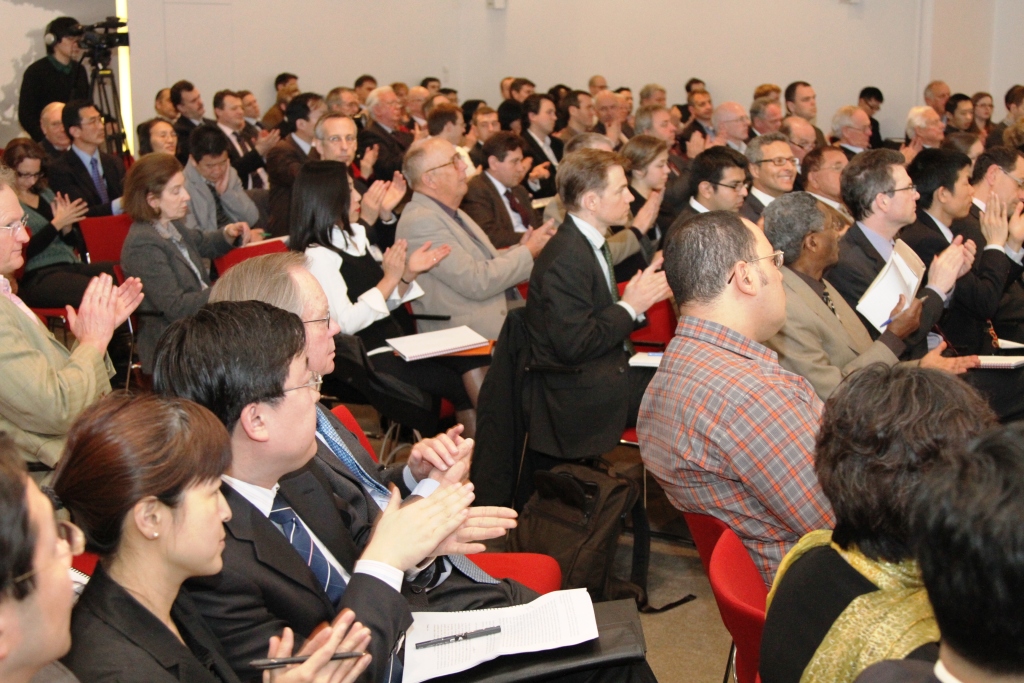
|

